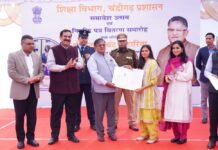eCourts Mission Mode Project: A Digital Revolution
Author Name: Shri Vikalp Mishra, Advocate practising at the High Court of Delhi and Supreme Court of India
A revolution of any kind necessitates a collective force, unified energy and a demand for active and inclusive change. With the rise of the digital revolution, the technological era is reshaping its own rhythm. People are deeply immersed in technology, as it has seamlessly integrated into every facet of their lives.
To harness the benefits of technological advancements, the eCourts project was conceptualized as a part of National eGovernance Plan. The project aims at ICT development of the Indian Judiciary based on the “National Policy and Action Plan for Implementation of Information and Communication Technology in the Indian Judiciary”.
The eCourts Project is being implemented in a joint partnership between the Department of Justice, Ministry of Law & Justice, Government of India and the eCommittee, Supreme Court of India in a decentralised approach through respective High Courts.
Phase-I of the project primarily focused on enhancing basic computerization and internal connectivity within courts. It encompassed the establishment of a LAN, the launch of the National eCourts portal and the computerization of 14,249 District and Subordinate Courts.
Building upon the foundation established in Phase-I, Phase-II of the project spanned from 2015 to 2023. This phase maintained the momentum of technological enablement of courts while emphasizing citizen-centric e-Services. As part of this endeavor, 880 e-Sewa Kendras were established to provide support for e-filing and supplementary services within court premises. Furthermore, 99.4% of court complexes were connected through a WAN and 18,735 District and Subordinate Courts were computerized. The eCourts MMP has yielded remarkable results in the judicial sector. For instance, to address traffic challan cases, 25 Virtual Courts have been established in 20 States/UTs. These courts have heard more than 4.24 crore cases and in more than 47 lakhs cases online fine of more than Rs.492.79 crores have been realized.
Amidst the COVID-19 lockdown, District and Subordinate courts, along with High Courts, heard a remarkable 3 crore hearings through video conferencing. The Supreme Court conducted 6,24,427 hearings under similar circumstances. To enhance accessibility to court proceedings, live streaming was introduced in 7 High Courts and the Hon’ble Supreme Court of India.
Building upon the achievements of eCourts Phase I and Phase II and in alignment with the ‘Digital India’ vision, the Union Cabinet allocated a substantial budget of Rs. 7,210 crores for eCourts Phase III to further expand and strengthen the judicial infrastructure through technology enablement under the eCourts project.
Phase III of the e-Courts project envisions a judicial system that is more affordable, accessible and transparent for all. Given the large, diverse and constantly evolving needs of stakeholders and the constant evolution of technology, the focus of Phase III is on adopting technology and providing a robust governance framework. It envisions an infrastructure for the judicial system that is natively digital. It does not merely digitise paper-based processes, It signifies a transformative shift towards a digital environment, encompassing novel elements such as Paperless Courts, integration of emerging technologies like AI and Online Dispute Resolution.
Under the visionary leadership of Prime Minister Shri Narendra Modi ,Phase III of the eCourts project has been launched. The goal is to ensure equitable access to justice for all, as enshrined in Article 14 and Article 19 of the Constitution. It aims to establish a more accessible and cost-effective justice delivery system, fostering a renewed and dynamic India where access to constitutional courts will be easier than ever before for the common citizen.
In the words of B.R. Ambedkar, “Justice, in its true essence, should serve as a shield to protect the oppressed and a beacon of hope for the marginalized. It must be impartial, unyielding to power, and accessible to all, irrespective of caste, creed or social status. Only through the pursuit of justice can we create a society that upholds dignity, equality, and fundamental rights for every individual.”



















